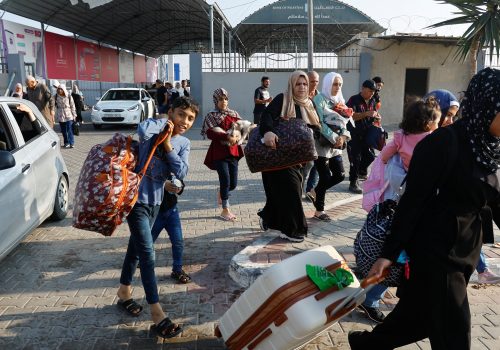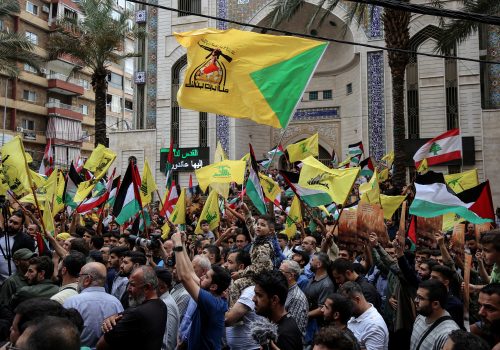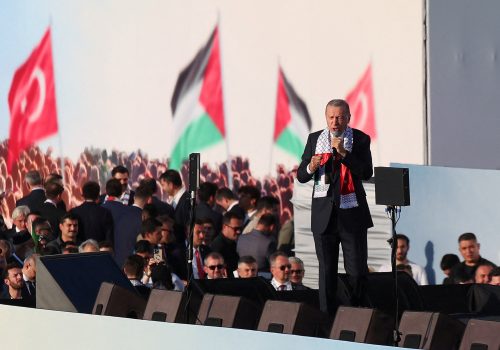On a knife’s edge: How the conflict in Gaza could tip the scales in North Africa
In today’s ever-shifting global landscape, the world’s attention is squarely focused on the war between Israel and Hamas, which raises concerns about a potential spillover in the Middle East. However, the evolution of political and economic developments in North Africa deserves its share of attention, as they could soon claim center stage if ignored or misinterpreted.
Scholars have repeatedly emphasized the importance of a stable and forward-looking Southern shore—the countries of North Africa—for the peaceful evolution of Southern Europe’s polities. Unfortunately, that possibility is farther away than ever and the current situation can quickly get worse.
To begin with, the Morocco-Algeria rivalry, which has always been focused on the issue of the contested territory of the Western Sahara, has caused the two countries to engage in a decades-long arms race. This security issue, which is about both countries’ power and legitimacy more than anything, could very well lead to a military clash. This dispute over Western Sahara is an excuse to have an enemy at the border and justifies the power of the ruling classes in Algeria and Morocco.
Nevertheless, in recent years, efforts have been made to bring rapprochement between Morocco and Algeria, such as reopening the borders and establishing a direct diplomatic relationship. Much hope was raised by various Arab populations in the region during the 2011 Arab Spring period. In the same vein, Moroccans and Algerians shared a keen interest in fostering ties. With the onset of the democratization process in their respective countries, citizens aspired to exert pressure on their governments for rapprochement.
However, this wishful thinking was short-lived, and more reasons for confrontation have recently emerged. For starters, in 2020, the normalization of certain Arab states with Israel (including Morocco) went beyond creating strong tensions within Algeria, producing a radical reaction that prompted it to join states like Libya, Iraq, Iran, and Syria in opposing the accords at the time.
The consequences of the Algerian response are significant in the context of the ongoing Israel-Hamas war, particularly for Italy and other European nations that have come to rely on Algerian gas as a substitute for Russian gas. Irregular migration from Libya, Tunisia, and Algeria has plagued Italy for years and is likely to increase as tensions between these countries remain unresolved.
Separately, in Tunisia, the newly elected President Kais Saied has centralized all constitutional powers to himself, turning the country towards authoritarianism. However, what could be more dangerous is that Tunisia is falling into the arms of its powerful neighbor: Algeria. The more Tunisia plunged into its economic and political crisis, the more President Saied needed support for its political and economic development that was not conditional from Western countries.
This issue is raising concerns for Egypt, too, which has been striving to extend its military and political rule to its neighbor and civil war-ravaged Libya. Disorder and negative consequences at Egypt’s western borders have been partially avoided by supporting one of their proxies and the ruler of Libya’s eastern provinces: General Khalifa Haftar. The strongman, supported by Russian mercenaries, the Wagner Group, achieved a moderate level of order through a bloody war against all opposing clans and tribes—which he has lumped together as Islamist terrorists—as well as through establishing a reign of terror in the country.
However, this went undetected by most until the tragedy of the September 9 floods in Derna province, which killed about ten thousand people. Now, many are beginning to question Haftar’s and, more precisely, his six sons’ involvement in the military and economic realms of the province. Since then, clashes have occurred, and the possibility of a revolt by the tribes and urban population increases by the day.
Egyptian dictator Abdel Fattah el-Sisi may try to intervene directly to alleviate the bordering region. Still, there is little doubt that this would cause a strong reaction from Algeria, which would see an attempt to expand Egyptian power as tilting the balance of power in North Africa. Moreover, the power that controls the western part of Libya, Turkey, will not sit idly by and will most probably intervene directly while having Algeria in its corner. The idea of a Turkish-Algerian entente was challenging to conceive until the summer when Turkish President Recep Tayyip Erdogan de facto joined the normalization refusal front headed by Algeria.
Given the current scenario, the situation of the Israel-Hamas war may force Egypt to face its contradictions, leading it to either a confrontation with Israel in defense of the Palestinians or against Hamas in support of its peace agreement with Israel. In either case, the consequences for Western countries would be unthinkable.
In light of these multifaceted challenges, Western countries should take into consideration the ongoing tensions in North Africa to make their decision-making process regarding the events in Gaza more precise and holistic. The only viable solution for a lasting peace—rather than a temporary fix—is to formulate a plan that facilitates the reconciliation of the Palestinians and Israelis and shapes their political and socio-economic progress in a manner that does not neglect the entirety of the Arab world. This is the only path forward.
Karim Mezran is director of the North Africa Program at the Atlantic Council’s Middle East Programs.
Further reading
Fri, Nov 3, 2023
As the Gaza war continues, Egypt is facing pressure to act
MENASource By Shahira Amin
As Israel expands its ground raids in the Gaza Strip, Egypt is witnessing the ripple effects of the war and faces growing pressure to act in regard to Palestinian refugees.
Wed, Oct 11, 2023
Hamas’s attack on Israel was straight out of Hezbollah’s playbook
MENASource By David Daoud
The genesis of Operation Al-Aqsa Flood appears to originate with Hezbollah, at least in part. The pressing question now is what will Hezbollah do next?
Mon, Oct 30, 2023
Erdogan leans on Israel, pushes for post-war role in Gaza
MENASource By Rich Outzen
The Turkish president's ultimate goal is to be present and influential in the post-war settlement regarding Gaza and to be a key player in the mediation and reconstruction process.
Image: Algerian deputies in solidarity with the Palestinian people in the face of the violations and abuses of the Israeli occupation, in Algiers, Algeria on October 31, 2023, during an extraordinary session of the National People's Assembly (APN) devoted to the evolution of the situation in Palestine, the need to ensure ''urgent international protection to the Palestinian people in the face of the violations and abuses of the Israeli occupation'' (Photo By Amine Chikhi / APP) (Photo by APP/NurPhoto)


